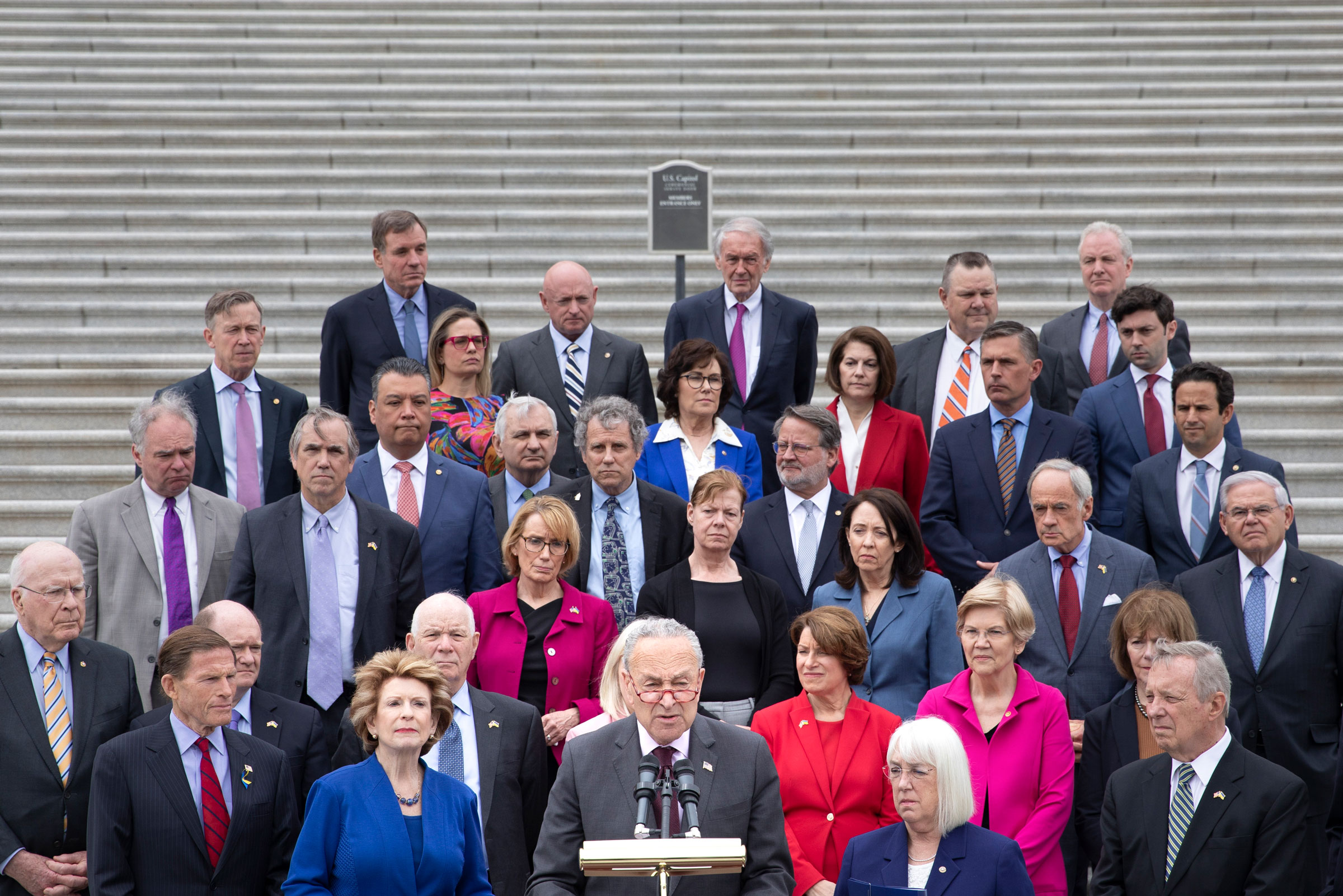
This article is part of The D.C. Brief, TIME’s politics newsletter. Sign up here to get stories like this sent to your inbox.
The numbers are comically small, rounding errors in tallies with far fewer consequences. The non-funny punchline? Races for the state legislature, where as few as a dozen votes could make the difference between which candidate wins, and, in some cases, which party controls a major lever of state government.
Because the margins are often so miniscule, a group of Democratic strategists are looking at quickly shelling out millions of dollars to track down likely Democrats and adding them to the voter rolls, no matter how inefficient or costly the chase may be.
It’s decidedly unsexy work and can be grueling, but Democrats have for decades been complacent—and, as a result, 54% of state legislators in this country are Republican, and 62% of the state legislative chambers are under Republican control.
Put another way: Democrats outnumber Republicans on voter rolls, but they are concentrated in urban areas while ceding suburban and rural areas to Republicans. Gerrymandering has kept Republicans competitive because they own the sparsely-populated rural parts of states while ceding the cities to the Democrats. The result is diluted Democratic power that doesn’t match their objective clout.
Forward Majority, one of the independent groups that sprung up to fill in the gaps laid bare in Hillary Clinton’s loss in 2016, has already spent some $50 million in the years since on getting Democrats competitive again in state legislative races. Now they are joining a newer effort to get out into less densely populated areas and reach some of their hardest-to-reach likely voters.
“State legislatures are ground zero in the fight for democracy, but that’s just starting to hit people’s radar,” says Vicky Hausman, a co-founder of Forward Majority. “Every single issue that you care about will be decided in state legislatures.”
The frontline priorities for Forward Majority are Arizona, Michigan, and Pennsylvania—three states where independent redistricting programs reset the political boundaries. Strategists estimate that there are as many as 500,000 Democratic-minded allies in those states who are not on voter registration lists. As the theory goes, their participation in the next election could make the difference between continued Republican control of state legislatures in those three states.
In 2020, Arizona Democrats could have swung back into control of their legislature with roughly 3,000 more votes. Another 8,600 Michiganders could have done the same, and the gap in Pennsylvania was a still-doable 22,000 votes. In other words, even if only 10% of the new registrations on the list of highly targeted districts show up, that’s a pickup of 25 seats and a check on Republicans in major battleground states.
The long-term plans have investments going to Texas, Georgia, and North Carolina, where Forward Majority’s data scientists estimate a combined 1.7 million unregistered Democratic voters live in the six competitive states.
Strategists concede that running up tallies in cities is more cost-effective, and has the added benefit of helping statewide candidates, like those running for the White House or Senate. But that still leaves plenty of room for growth in state House and Senate districts in more rural and suburban areas. And some of the maps for those districts are fairer than they’ve been in a long time, if not favoring Democrats.
If all of this sounds super-nerdy, it is. But consider what would have happened if then-President Donald Trump had successfully organized a pressure campaign on Republican-controlled state legislatures in Arizona, Michigan, and Pennsylvania to ignore the results of the 2020 elections and send alternative electors to Washington for the Electoral College vote. It seems insane, but Trump has not relented on his theory that allies in state capitals can legally do such a thing. Congress is dragging its heels in putting in place protections against that kind of bananas effort, as TIME’s Eric Cortellessa reports today, and time is running out to do so.
That leaves state lawmakers as perhaps the final safeguard to Trump—or someone like him—hijacking the next presidential vote count.
Then, there’s the recent shock to Democrats that the Supreme Court appears ready to overturn abortion protections embedded in the 1973 Roe v. Wade decision this summer. If that happens, as a leaked Supreme Court ruling suggests, many states will rush to institute new limits or guarantees when it comes to abortion access. Again, Democrats in Congress appear unable to get their act together to codify abortion rights into federal law, which again leaves state lawmakers in an especially powerful position.
“Roe is a wake-up call for a lot of folks, but sadly for anyone who has been working in the state legislative space, it’s in no way a surprise,” Hausman says.
The fight for these handful of voters may seem small in the grand debates unfolding over war in Europe, a pandemic that has now claimed 1 million lives, and threats to a half-century of abortion rights. But when so few voters can tip power in Phoenix, Lansing and Harrisburg, it’s hard for partisans on either side to argue against such an investment.
And this group of well-funded Democrats appears poised to spend heavily in the chase for neighbors that they have every reason to believe would vote for their candidates, if only they were registered to vote.
Make sense of what matters in Washington. Sign up for the D.C. Brief newsletter.
More Must-Reads from TIME
- How Donald Trump Won
- The Best Inventions of 2024
- Why Sleep Is the Key to Living Longer
- Robert Zemeckis Just Wants to Move You
- How to Break 8 Toxic Communication Habits
- Nicola Coughlan Bet on Herself—And Won
- Why Vinegar Is So Good for You
- Meet TIME's Newest Class of Next Generation Leaders
Write to Philip Elliott at philip.elliott@time.com